

Jester: Can you go into a little detail about how all of you originally met and eventually formed Gridlock?
Mike: I started the band a few years ago. I started by compiling equipment and trying to get a writing direction / focus of the band. I didn't really put any advertisements out for musicians, but put the word out amongst my friends in the music scene that I had a need for a vocalist and a drummer. There was a real strong focus for the direction of the band from the beginning. It wasn't anything just hastily put together. I ended up meeting Cadoo, and had known Bob for quite a few years. It was great luck to meet Cadoo because we hit it off right away stylistically and started writing. So right around the time we were looking for a drummer, Bob became available.
Jester: Do any of you have any other musical background prior to Gridlock?
Mike: We all do. We've all been playing in bands for years.
Cadoo: Mike actually went to school for music.
Mike: I did the whole college music theory thing as far as being qualified to be a classically trained musician.
Jester: Has any of the music been anything like you're
doing now?
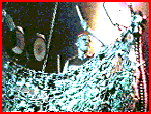
Cadoo: I originally come from a gothic background so I tend to go for a darker style of sound.
Jester: What motivated you to move to this particular style of electronic music as opposed to something else?
Mike: I know all three of us have been in guitar bands before so there was a real push to write material with synthesizers. We wanted to stay away from the more traditional style of making music, not because it was something that everyone else was doing, but because it interested us.
Cadoo: We still wanted to try and make something harsh.
Bob: I think there is a lot of ground you can cover with a machine style of music that none of us have done before. We were all into a lot of electronic music in the past as well. I was into house and they were into a lot of trance.
Jester: Do you have any type of formal writing method when you sit down and compose new material?
Mike: No. It's usually someone coming up with a specific piece of a song and someone else just builds upon it. The only consistency we have is that the majority of the time it always revolves around drums.
Jester: How is the newer material compared to the old material? Is there any type of stylistic change between the two releases?
Mike: Actually there is some real growth. There is also a song that was written during the same period as the first release, but it just wasn't finished in time to be included. The rest are all new tracks. There are some new styles of synthesizer movements where we are trying to get in touch with real-time MIDI. Most of the changes are on a technical end but we are trying to use MIDI in ways we have not used it before. Experimenting with machines.
Jester: Why did you choose to cover 'Metro' by Berlin?
Mike: Because I liked it when I was a kid!
Cadoo: I know it's probably bad to say, but we practiced today and we decided that we really hate playing that track live. It was more of a dancefloor tactic designed to get ourselves out there quicker. We wanted to choose a cover that would help expose us a little more.
Jester: You mentioned that you have a performance coming up
shortly. How many times have you performed live?
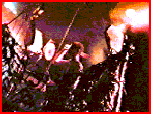
Mike: We try to organize our live shows around a writing period. With any electronic band it is very difficult to get music compiled and rehearsed. We are trying to group shows in a block so we can write new music, perform more shows, and swap back and forth. This show coming up will be Gridlock's second show.
Jester: What else do you do on stage besides your music? Do you have any type of visuals or interactivity with the audience?
Cadoo: We do have props. There's army netting, gas masks, and tubing.
Jester: What kind of response did you have to your first show?
Mike: It turned out surprisingly well.
Jester: What kind of feedback have you received from all the free tapes you've sent out?
Mike: Really good. Obviously we have done a lot of work on the Internet. We've done a free giveaway online for over a year now and that gets us a lot of visitors to our web page. We are always sending demos out every single week. We are always trading correspondence with people and getting new material out once it is written. It's been growing quite fast and we are quite happy.
Jester: Are you interested in shopping any demos to labels?
Mike: Yes, we have sent quite a few tapes to labels.
Jester: Any label give you any type of response?
Cadoo: There is interest.
Jester: I noticed you chose to name one of your tracks with a Latin title "Pulvis Et Umbra Sumus"?
Cadoo: "We are dust and a shadow"
Jester: What was the motivation behind that?
Cadoo: It was a title that I found that fit the context of the song. The premise that we all really don't know what's going on around us.
Jester: Is it a mortality issue?
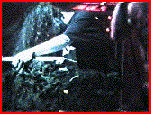
Cadoo: I have trouble analyzing my own lyrics. But it is more of not knowing about the end of things.
Jester: Then on the new tape you have a German title, "Ich Dien".
Cadoo: I'm trying to stick with a foreign title for each release. (joke) "Ich Dien" translates to "I serve". The lyrics are probably the most understandable and straight forward I've written to date.
Jester: If you were forced to classify yourselves as a particular style of music, what would you call yourselves?
Mike: I would say we are synth-based industrial.
Jester: You seem real hesitant to use that "I"-word.
Mike: We tend to dislike the whole labeling issue.
Cadoo: We are definitely a synth-based band with our own unique percussive sound. We don't rely on any stock machine samples to do any of our work.
Jester: What motivates you to write and compose music?
Mike: I think we all definitely make music because we want to. We are not a straight-forward "dance friendly" type of band. Our music is harsh. We are not trying to please the dance crowd by any means.
Bob: We don't consciously write a song to make it dance oriented.
Mike: We write our music for ourselves.
Cadoo: We've actually been slagged for being too slow and not having enough dance beats.
Mike: Yet when people get our tapes they always make a comment about the ambience and the mood of the music. These are people who are getting the tape and giving us an honest opinion rather than industry types slagging us for not being "club friendly".
Jester: Are you trying to pass along any message in your lyrics?
Cadoo: Not really. Most of the lyrics are so garbled that
you can make out maybe only one word per song. My lyrics are mostly rants about
how I am feeling at the moment. If you really listen to our music, I'm not just
singing to hear the sound of my own voice. I think the music comes first and my
lyrics are more of an accent.
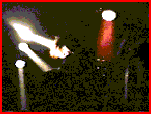
Jester: Have you ever thought of printing your lyrics so that people have an idea of what you are saying?
Cadoo: It seems lately, enough people have asked me that exact question, so I might have to start doing just that.
Mike: We've actually received a great deal of requests for lyrics so I think it will happen eventually. Everything else we've done in the past has always been at cost, and the extra expense of printing the lyrics is something we can't yet justify. We can't justify having a four panel, full color J-card just for promotional purposes.
Cadoo: We mainly give these tapes out for free. I think if we can get the music out faster and cheaper we should go that avenue. The music is the most important thing.
Jester: So you are more into the home-grown guerilla recording concept?
Cadoo: We do record everything in a small home studio. We have no live instruments, everything is written electronically. Yet in a MIDI sense we don't require a lot of space. It does the job.
Mike: We do have a very home-grown attitude of doing everything from start to finish in a home studio. Completely self contained from start to finish.
Jester: Did you dump a lot of money into equipment?
Mike: You could say that. I started the band with an idea of how many people would be involved. I bought all of the equipment and went out to find people who agreed with the ideas I had, and decided to do it right the first time. So when the first tape came out it was at the end of a three year period of building the band. Now we are at a blossoming period where we are beginning to reap from the benefits of taking our time to get initially started. There was a great deal of forethought to the inception of this band.
Jester: Along the lines of you being the drummer, are you comfortable with that kind of process of having the drums written electronically?
Bob: Definitely. It is a totally new way of doing things
for me after being so used to sitting behind a kit and writing music along with
everyone else. Most of the stuff has even been written without me being present
because I am the newest addition to the band. It takes a drummer to a totally
different level because I have to learn all the parts when we play live. When
we are rehearsing we often just jam a little with odd sounds loaded into the
drums and we find that we often come up with pieces of new material that way as
well.
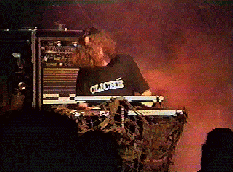
Jester: What sort of timing reference do you use when you play live?
Bob: We've got a rear mounted monitor that sends a direct channel 'click' directly to me that the audience can't hear. It was mostly a crutch at first but I've been playing more on my own lately. The less I've come to depend on the machine to queue me, the more I feel I can make the music more free form. That way I don't feel like the machine is telling me what to do.
Mike: Yet at the same time, Bob helped shape a large directional shift in the new material because all three of us were writing music.
Jester: Do you also play with an acoustic kit as well?
Bob: Yes. I've been playing since I was nine. Doing live industrial music is really a new thing for me, but I have been playing drums for a long time. Playing along with the machine reminded me a great deal of drum lessons where I used to play along with a click to keep time.
Mike: It was always very important to find a person who had played live for a number of years to be a part of the band because we didn't have that luxury of learning from scratch. By each of us having a lot of experience behind us, it allowed us to not necessarily work within the constraints of normal music.
Jester: How did you feel playing electronic pads for the first time?
Bob: Pretty weird. At first the drums were set up like a traditional set, but it felt like I was playing on table tops because the pads were so hard. Now I have them set up in different places according to the sounds that I am using so I can move around a lot. It makes it a lot more physical.
Jester: How close to your studio setup is your live setup?
Mike: Very close.
Cadoo: We disassemble half the studio and take it with us.
Mike: You take into account with all the drum sounds, live samples, and all the ADAT sounds, and a DAT in case the ADAT goes down, that we have a lot of gear we need to take with us. We try to play and embellish as much as we can so the tracks don't remain static. We remix a few tracks so they are different for the live shows. Most of them are longer when played live. We try and keep it from being a rehash of our releases.
Jester: Have you ever tried to play a track completely live?
Cadoo: We actually have a few songs that we play completely live.
Mike: We might even play some in the upcoming show. That's always my favorite part of the show, when I hit the stop button on the ADAT. It allows us to go back to that live feel yet remain totally electronic.
Bob: It's great to just play entirely live.